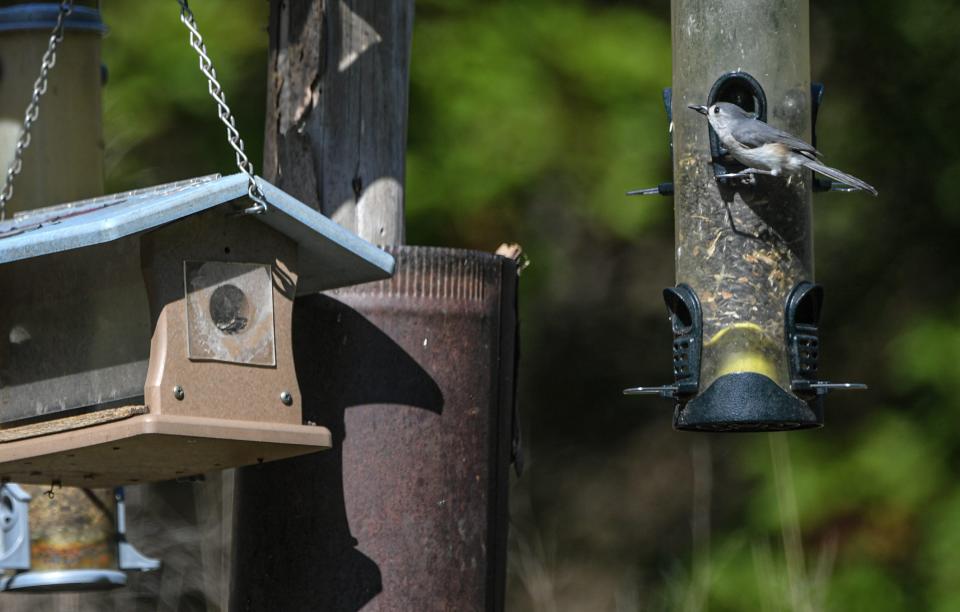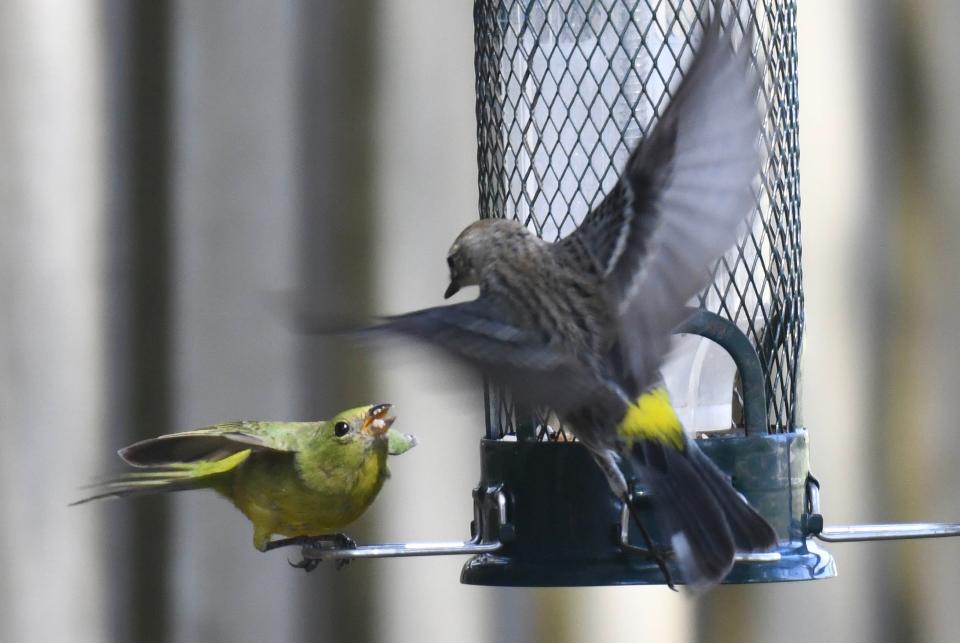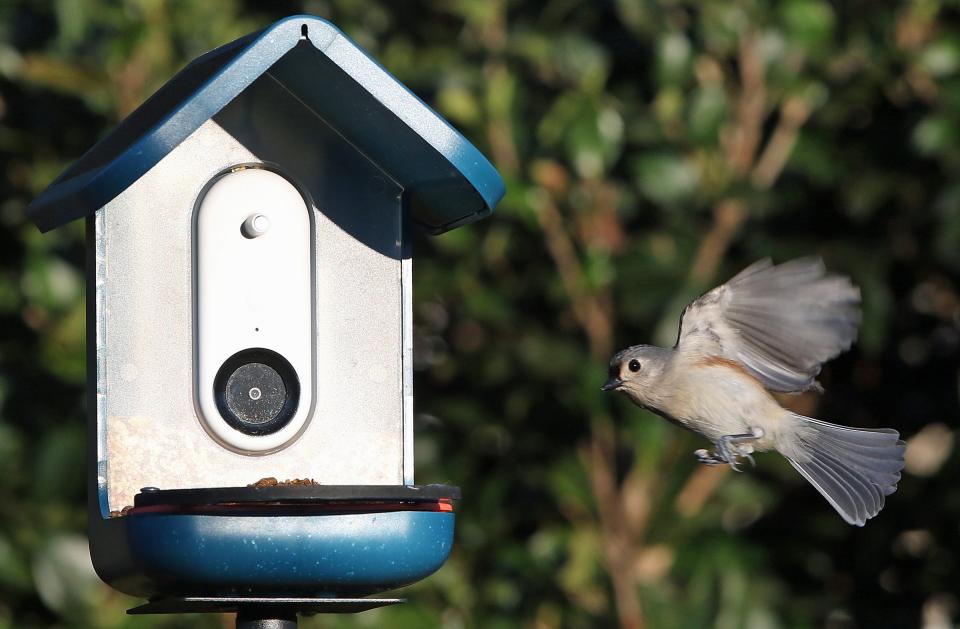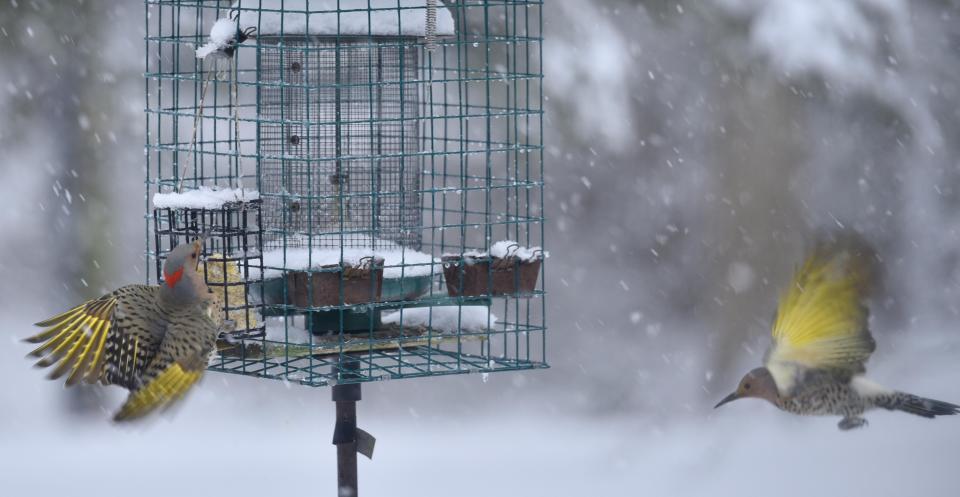Bird feeding can be great for humans but could harm the birds we love, study shows
- Oops!Something went wrong.Please try again later.
The beginning of COVID-19 lockdowns forced many to seek safer ways to connect with nature, and new research shows that bird-feeding around the world dramatically increased. But is it actually okay to feed wild birds?
According to the peer-reviewed article published last week in PLOS ONE, feeding wild birds in backyards was already known to be extremely popular in many parts of the northern hemisphere and in Australia, despite being strongly discouraged.
“There was a surge in interest beyond traditional bird-feeding countries in North America, Europe and Australia: 115 countries in total, including many where feeding was assumed not to occur,” wrote research co-author Darryl Jones.


Bird migration: Swarms of birds will fly over the US soon. Explore BirdCast's new migration tool to help you prepare.
Bird feeders mostly benefit humans
Despite compelling evidence that feeding “can lead to problems for the birds,” there is research that highlights the benefits of spending time in natural settings for people's well-being, mental health and sense of purpose.
According to Jones, some experts oppose feeding wild birds for multiple important reasons, including:
The spread of diseases (for example, feeders have helped spread conjunctivitis in house finches — the eye disease impairs their vision — making it hard for them to detect predators and feed, according to U.S. Fish and Wildlife Service)
Poor nutrition as a result of an unbalanced diet
Advantaging already abundant species
Changing community structure (birds that visit feeders prosper at the cost of those that don't)
Altering migration patterns (according to U.S. Fish and Wildlife Service, an example is Carolina wrens, which have extended their range north, partly as a result of feeders, research suggests.)
“These impacts occur everywhere wild birds are fed and are potentially serious,” Jones writes. “On the other hand, engaging with wild birds in this way is now recognized as one of the most effective ways people can connect with nature,” which has become increasingly difficult because more people worldwide live in large cities, Jones says.
A study published last year in Scientific Reports used a smartphone app called Urban Mind to track and collect people’s real-time reports of their mental wellbeing while birding between April 2018 and October 2021. Research from King’s College London found that seeing or hearing birds is associated with an improvement in mental wellbeing that can last up to eight hours.
“People throughout the world were forced to remain close to home,” Jones says. “Aspects of life that seemed to be carrying on regardless, such as birds arriving each day to be fed, may have been a course of comfort and reassurance.


“These trends mean the simple, common practice of attracting birds to your garden by feeding them is taking on much greater significance for the welfare of both birds and people,” Jones writes.
According to BirdLife International, the official scientific source of information on birds for the IUCN Red List, “range-restricted, rare and threatened species understandably attract much conservation attention, but more familiar, numerous and widespread birds are no less crucial to biodiversity.”
Birding in National Parks America's 10 best national parks for birding and an interactive map for summer bird-watching
Are bird feeders beneficial to birds at all?
Some studies show that birds can benefit from feeders during migration and harsh winters, and some believe that feeding birds may help offset our species' decimation of woods and meadows into lawns and shopping malls, according to U.S. Fish and Wildlife Service.
“There’s nothing wrong with bird-feeding,” writes Paul Baicich, co-author of "Feeding Wild Birds in America: Culture, Commerce and Conservation," published in 2015. “The birds don’t need the feeders. We do.”
Study looked at bird feeding Google Trends in more than 100 countries during and after lockdowns
Since previous studies documented a global increase in birding during lockdowns, researchers wanted to determine whether interest in feeding birds might have increased as well. The study relied on Google searches to measure bird-feeding interest in each country, which means the ability to adequately gauge interest in countries that are lower income or less internet accessible.
Researchers found a clear association between the level of interest in feeding and species diversity. Countries that lacked bird-related search interest had an average of 294 bird species. In contrast, those countries with clear interest had an average of 511 species.
This clear difference suggests that having a greater variety of species prompts more bird feeding. It may also mean places with more species have a larger number of bird types living in their cities (where most feeders live). This remains to be be investigated. Researchers believe that feeding birds leads to more birds overall, but not more species.
What factored into the findings?
Weekly frequency of search terms, which include "bird feeder," "bird food" and "bird bath," on Google Trends for 115 countries with sufficient search volumes from Jan. 1, 2019, to May 31, 2020 “to see if these searches increased during each country's specific lockdown period.”
Study reviewed bird species richness data for each nation from the BirdLife International database.
Discarded food scraps were not counted as feeding.
What did they discover?
It only took about two weeks into every surveyed countries' general lockdown for bird feeding interest to surge, according to data from Google Trends reviewed in the article. This happened in both the Northern and Southern hemispheres.
In contrast, in the 52 weeks leading up to lockdowns with the week immediately before, researchers found “no discernible change” in bird feeding interest.
A “clear association” which suggests that countries with more bird species diversity have greater levels of interest in feeding them.
How to minimize risk when bird-feeding
If you are going to feed wild birds, here are some best practices Jones offers:
Keep the feeder extremely clean to avoid diseases.
Don’t put out excessive amounts of food because it’s unnecessary.
Provide species-appropriate food (which is never human food) from reliable pet food companies.
This article originally appeared on USA TODAY: Bird feeding can harm, disadvantage avian population, new study shows

